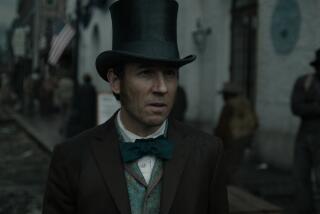Gore Vidal on Lincoln
- Share via
Gore Vidal’s well-written (is anything he has done not well-written) diatribe against academic historians in general and Dr. Richard N. Current in particular, which appeared in your Opinion section on March 20, deserves a reply.
Vidal alleges that his “novel” “Lincoln” contains nothing but “agreed upon facts.” But he does not tell us who agreed. The author assumes too much. One sees this on the book jacket in which it is represented that the book is “history.” This does real damage to the reading public as it is a misrepresentation. While many of the “facts” related to us in the novel are historically correct, there is at least an equal number which are not. How is the reader to discern between the two unless they have read an authoritative work? Vidal says there are none. Yet, there is a consensus among professional and amateur historians that at least two exist--Stephen B. Oates’s “With Malice Toward None” (1977) and Benjamin Thomas’s “Abraham Lincoln” (1952).
In order to support his contention that Abraham Lincoln still believed in removing all of the “colored folk” to another country (“colonization”) until his death, Vidal attempts to turn the tables on one of his critics, the gentlemanly and scholarly Prof. Current by quoting from Current’s work “The Lincoln Nobody Knows” in which Current has Gen. Benjamin Butler reciting his conversation with President Lincoln in the spring of 1865 where the President allegedly endorsed and wished for the total removal of blacks from the country. The problem with this citation is that Vidal takes Current’s comments out of context. Current was only citing what Butler alleged had happened and indicated Butler’s lack of credibility. In fact, the conversation alleged by Butler never took place as proven through the research of Dr. Mark E. Neely Jr. in his piece for Civil War History (March, 1979) entitled “Abraham Lincoln and Black Colonization: Benjamin Butler’s Spurious Testimony” published 21 years after Current’s book and five years before Vidal’s novel.
Being the purist he is, Current has no use for “fictional history” or “historical fiction” in whatever form. While I would not go that far, as I believe there is a place for a historical novel, it is clear that Vidal went too far as he pretends his book to be “historical.”
It would be more accurate and acceptable if Vidal treated his work for what it is--a highly readable novel.
FRANK J. WILLIAMS
President
Abraham Lincoln Assn.
Springfield, Ill.
More to Read
Sign up for our Book Club newsletter
Get the latest news, events and more from the Los Angeles Times Book Club, and help us get L.A. reading and talking.
You may occasionally receive promotional content from the Los Angeles Times.










